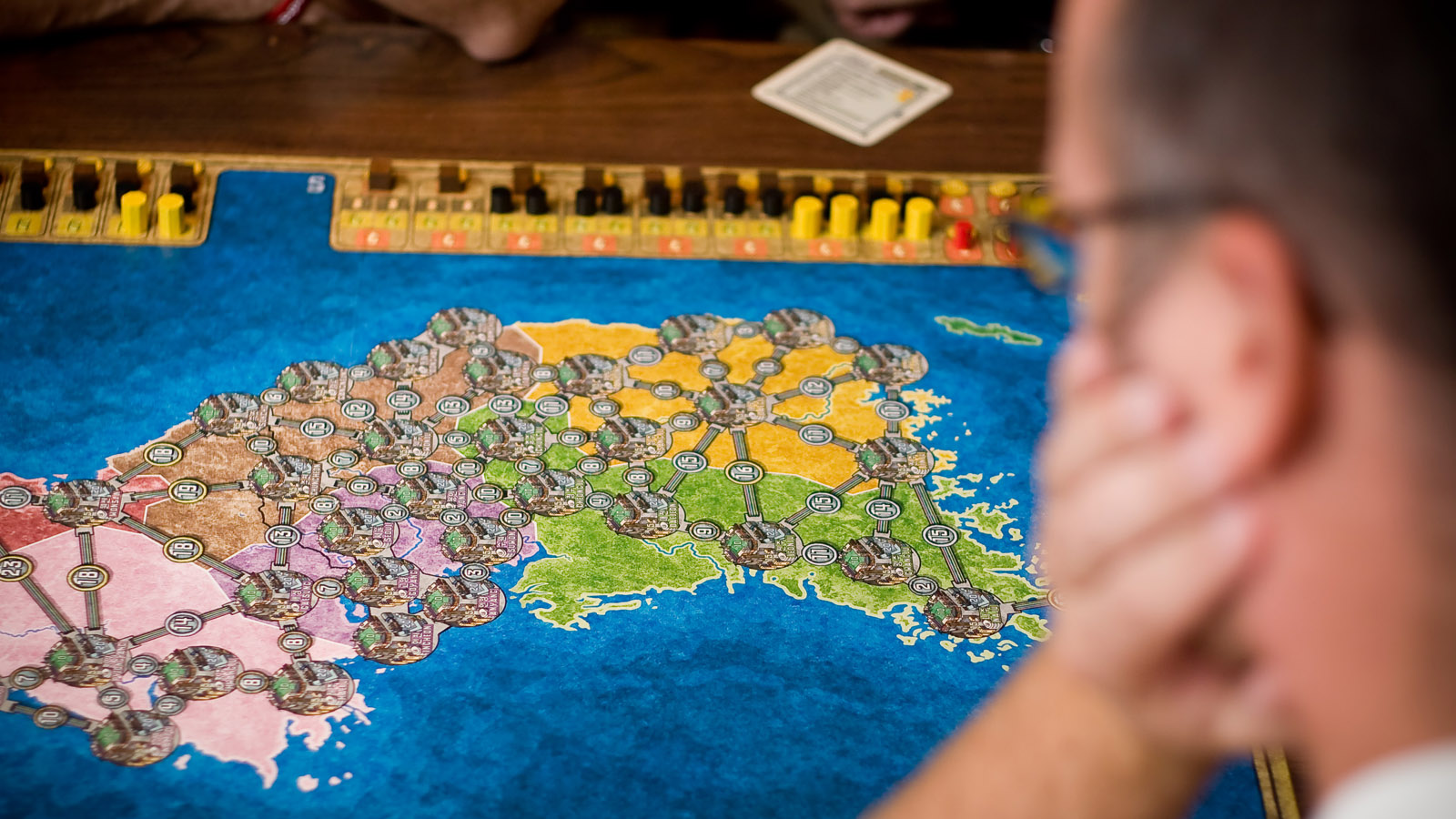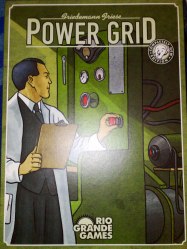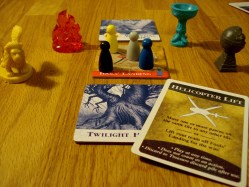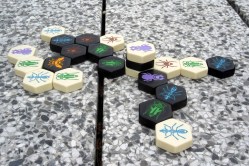Maybe it was moving back to the city where I was a teenage nerd that reignited my interest in certain geeky pursuits. Or perhaps it was something more insidious, like my lizard brain grasping at receding youth and independence in the face of impending fatherhood. Whatever it was, it took me and my pregnant wife to a Denver board game store, where I wanted to find something akin to global-domination classic Risk or the far geekier Axis and Allies that I’d played in high school.
She, an environment and social-justice journalist who doesn’t register on the nerd scale — no interest in global war, space, fantasy, the occult — found probably the only thing on the shelves that could have caught her eye even before meeting me. This game was called Power Grid. Of course.
Our visit to that game store, and the hours we’ve spent playing Power Grid (more on that later), woke me up to the board-game renaissance underway right now. Don’t think Monopoly or Mousetrap. Think Risk, or better yet, the nerd dog-whistle standby that is Settlers of Catan. Think of the most complicated, engrossing videogame you’ve ever played (or lost a loved one to), and put it on your dining room table with a cardboard world and little wooden pieces.
The games range in complexity, mechanics, and theme — and I was surprised to find that Power Grid was far from alone in its basis in energy and environment. I spent a little time searching and talking to fellow game geeks, unearthing a few games our fellow eco-nerds might dig. Here they are, in order from the very complicated to the very approachable:
POWER GRID
First of all: As one friend of mine enjoys telling people, Power Grid is very German. Its creator’s name is Friedemann Friese, and the original title of the game, in German, is Funkenschlag. The game plays 2-6 patient players and is listed as taking as few as 90 minutes, but that’s baloney — it’ll take two hours at the minimum your first time or two, and with more players it goes on even longer. But don’t worry, those Germans know how to have meticulous fun!
The object: Power as many cities as possible with your utility company, which you build from nothing into a network of coal, oil, garbage, nuclear, and green power plants. You need to balance your budget on buying power plants and raw materials to fuel them — and the prices for each are subject to the actions of other players. If everybody’s buying coal, for example, the price of coal quickly rises.
And: The base game comes with U.S. and German maps, and you can shell out more money for other geographies with unique challenges, like the clever and quirky North and South Korea map (which comes with the stultifyingly boring China map, complete with, not kidding, a simulated planned economy). The game also comes with conscience dilemmas for greenies — my wife, for example, cannot bring herself to buy coal plants, so she will overpay for clean-energy plants. The all-green strategy is objectively ridiculous, as there are a finite number of green power plants available in the game — if your strategy is all-green, and other players know that from the outset, they can leverage that information by, say, bidding up the green power plants. Infuriatingly, my wife still wins at least half of the time with me.
Similarly: There’s an older game called Crude: The Oil Game that is also supposed to have a really robust economy. Players take on the role of oil company CEO and have many of the same decisions available as in Power Grid — but players of Crude can also drill and produce the raw resources to sell into the market.
FORBIDDEN ISLAND
First of all: This game’s theme has nothing to do with the environment. Nothing at all. No, Forbidden Island is set in a could-never-happen fantasy world where waters are quickly rising, swallowing up an island right before our very eyes and everybody’s too busy hoarding shiny objects to address our impending watery doom. It’s for 2-4 players and plays in a quick half hour or so. Ages 10 and up.
The object: You and your fellow players are adventurers working together (how nice!) to salvage treasure from a rapidly sinking island. Each player will have a role that has some kind of specialty, and the fun is in strategizing how to leverage each player’s special skills in concert with each other player.
But: Don’t take my word for it — here’s Wesley Crusher from Star Trek playing the game with cool-haircut NASA sensation Bobak Ferdowsi!
Similarly: Another celebrated cooperative game, Pandemic, pits players in a race against four rapidly spreading diseases originating in four different places on the planet. For 2-4 players, ages 8 and up.
HIVE
First of all: If worrying about powering 17 cities in Japan is too much to think about, or if snagging treasure from a sinking island sounds a bit stressful, you might try Hive, a far simpler, down-to-earth (down-in-the-earth?) two-player game vaguely similar to chess. Unlike in chess, however, you can expect to wrap up a game of Hive in under 20 minutes. Ages 9 and up.
The object: You’ve got a small army of insects. Protect the queen.
And: There are only a few types of insects, and each moves in its own way, kind of like the differences in movement between a rook, a bishop, and a knight. The simplicity of the object and the rules, along with the short play time, makes for a highly replayable strategic game. There’s no board, which means you can play on just about any surface. The pieces are hexagonal tiles the weight of nice dominoes.
Similarly: Chess would do, but people also talk about an easier game called Blokus, another “abstract” strategy game in which players attempt to fit Tetris-like pieces onto a playing board according to simple rules, which naturally feel less and less simple as the game goes on. For 2-4 players, ages 5 and up.





